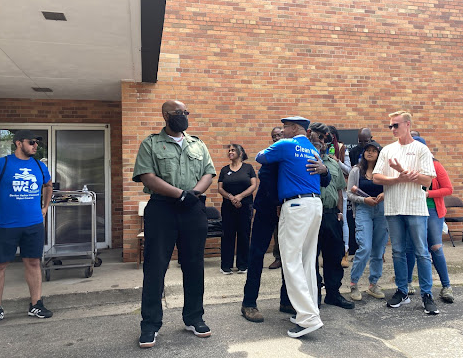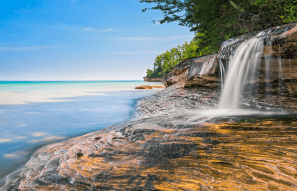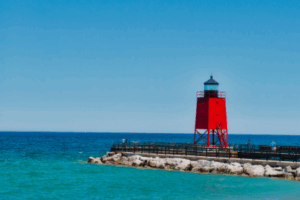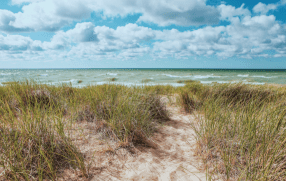Author: Anna Bunting, Freshwater Future Environmental Fellow
On May 28th, 2022, I attended a citizen’s march and demonstration in Benton Harbor with a group of other environmental justice students from my master’s program at the University of Michigan’s School for Environment and Sustainability. I heard about this event from a student documentary about the Benton Harbor water crisis. The municipal water system in Benton Harbor has been contaminated with toxic levels of lead since 2018. Reverend Edward Pinkney has been at the forefront of drawing attention to and organizing the citizens’ and state’s response to this crisis and the opposition to a professional golf tournament for years.
So what does this all have to do with a professional golf tournament?The exclusive professional golf course hosting the tournament is a part of a development that offers luxury housing and a decadent inn. This development was built on land that was originally donated by the Klock family as a park to save the natural dunes and for the enjoyment of children, but a portion of the park was acquired from the city of Benton Harbor for the golf course development, contributing to the disenfranchisement of the people of Benton Harbor. Residents called for 30% of the revenue from professional golf tour events located on the land be returned to the city, but they have not been taken seriously. This event intended to put the water crisis in plain view. Concerned residents, allies, and environmental justice leaders met at Harbor Harvest Urban Ministries to hear from speakers.
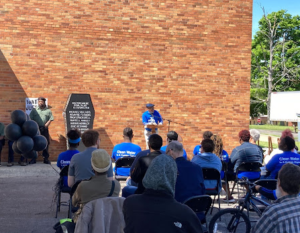
Claire McClinton, a long-time activist best known for her role in organizing in response to the Flint water crisis, spoke about the immense harm of Michigan’s emergency management law (Public Act 436) and its role in both the Flint and Benton Harbor water crises. Sam Riddle, a civil rights leader and political director at the National Action Network, and Jerry Goldberg, a lawyer and activist for environmental justice, both spoke on the role of racial discrimination in this crisis. Speakers felt the segregation of St. Joseph and Benton Harbor communities, one being wealthier and White while the other is disinvested and Black, is deeply tied to the fact that one has clean water while the other is being poisoned.
The keynote speaker, Omali Yeshitela of the Uhuru (“Freedom”) Movement, gave a speech connecting environmental injustices like the Benton Harbor water crisis to the history of the colonial project, slave trade, and racial capitalism in the United States and beyond. A Benton Harbor resident whose home tested to have lead levels above 400 parts per billion spoke about losing his otherwise healthy dog to the water crisis. Despite the inspiring leaders and dedicated citizens in attendance, he also pointed out the elephant in the room – where was everybody? The Benton Harbor water crisis has continued to be missed by mass media and has thus received far less public attention than the severity of this crisis deserves. There were about 40 of us at this march, attempting to bring attention to the massive systemic issues that speakers addressed: settler colonialism, environmental injustices, racial capitalism, land loss, police brutality, and how they are killing the people of Benton Harbor through both slow and immediate violence.
The demonstration itself took the form of a walking funeral procession that worked slowly through the streets from Reverend Pinkney’s church to the Harbor Shores golf course and back. Pallbearers carried a coffin that read “Death to Democracy” as well as the names of Benton Harbor citizens that died under mysterious circumstances. We carried signs that demanded clean water and the return of public lands but remained silent for the nearly 2-hour walk. We succeeded in stopping traffic, drawing the eyes and curiosity of many tournament-goers, and forcing the institutions upholding this injustice to meet at the table. In a call with Reverend Pickney this week, he told me that this demonstration applied the necessary pressure to begin discussions with the hosts of the golf tournament and considers it a success.
The people of Benton Harbor still need direct assistance as they continue to live without clean water. If you are able, Reverend Pinkney invites you to join him at his church at 275 Pipestone Street from 8 am-noon on Tuesdays, Wednesdays, and Thursdays to distribute free bottled water to all Benton Harbor residents. He can be contacted at his cell phone (269)369-8257 or email (banco9342@sbcglobal.net) if you would like to volunteer.

